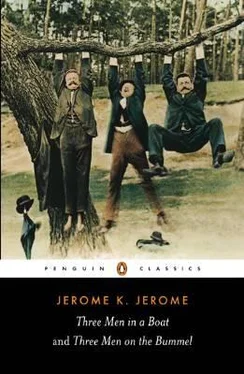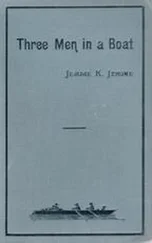Jerome Jerome - Three Men on the Bummel
Здесь есть возможность читать онлайн «Jerome Jerome - Three Men on the Bummel» весь текст электронной книги совершенно бесплатно (целиком полную версию без сокращений). В некоторых случаях можно слушать аудио, скачать через торрент в формате fb2 и присутствует краткое содержание. Жанр: Юмористическая проза, на английском языке. Описание произведения, (предисловие) а так же отзывы посетителей доступны на портале библиотеки ЛибКат.
- Название:Three Men on the Bummel
- Автор:
- Жанр:
- Год:неизвестен
- ISBN:нет данных
- Рейтинг книги:4 / 5. Голосов: 1
-
Избранное:Добавить в избранное
- Отзывы:
-
Ваша оценка:
- 80
- 1
- 2
- 3
- 4
- 5
Three Men on the Bummel: краткое содержание, описание и аннотация
Предлагаем к чтению аннотацию, описание, краткое содержание или предисловие (зависит от того, что написал сам автор книги «Three Men on the Bummel»). Если вы не нашли необходимую информацию о книге — напишите в комментариях, мы постараемся отыскать её.
Three Men on the Bummel — читать онлайн бесплатно полную книгу (весь текст) целиком
Ниже представлен текст книги, разбитый по страницам. Система сохранения места последней прочитанной страницы, позволяет с удобством читать онлайн бесплатно книгу «Three Men on the Bummel», без необходимости каждый раз заново искать на чём Вы остановились. Поставьте закладку, и сможете в любой момент перейти на страницу, на которой закончили чтение.
Интервал:
Закладка:
"After all," said Harris, "there is something about the British Sunday that appeals to the man with English blood in his veins. I should be sorry to see it altogether done away with, let the new generation say what it will."
And taking one each end of the ample settee, we kept George company.
To Hanover one should go, they say, to learn the best German. The disadvantage is that outside Hanover, which is only a small province, nobody understands this best German. Thus you have to decide whether to speak good German and remain in Hanover, or bad German and travel about. Germany being separated so many centuries into a dozen principalities, is unfortunate in possessing a variety of dialects. Germans from Posen wishful to converse with men of Wurtemburg, have to talk as often as not in French or English; and young ladies who have received an expensive education in Westphalia surprise and disappoint their parents by being unable to understand a word said to them in Mechlenberg. An English-speaking foreigner, it is true, would find himself equally nonplussed among the Yorkshire wolds, or in the purlieus of Whitechapel; but the cases are not on all fours. Throughout Germany it is not only in the country districts and among the uneducated that dialects are maintained. Every province has practically its own language, of which it is proud and retentive. An educated Bavarian will admit to you that, academically speaking, the North German is more correct; but he will continue to speak South German and to teach it to his children.
In the course of the century, I am inclined to think that Germany will solve her difficulty in this respect by speaking English. Every boy and girl in Germany, above the peasant class, speaks English. Were English pronunciation less arbitrary, there is not the slightest doubt but that in the course of a very few years, comparatively speaking, it would become the language of the world. All foreigners agree that, grammatically, it is the easiest language of any to learn. A German, comparing it with his own language, where every word in every sentence is governed by at least four distinct and separate rules, tells you that English has no grammar. A good many English people would seem to have come to the same conclusion; but they are wrong. As a matter of fact, there is an English grammar, and one of these days our schools will recognise the fact, and it will be taught to our children, penetrating maybe even into literary and journalistic circles. But at present we appear to agree with the foreigner that it is a quantity neglectable. English pronunciation is the stumbling-block to our progress. English spelling would seem to have been designed chiefly as a disguise to pronunciation. It is a clever idea, calculated to check presumption on the part of the foreigner; but for that he would learn it in a year.
For they have a way of teaching languages in Germany that is not our way, and the consequence is that when the German youth or maiden leaves the gymnasium or high school at fifteen, "it" (as in Germany one conveniently may say) can understand and speak the tongue it has been learning. In England we have a method that for obtaining the least possible result at the greatest possible expenditure of time and money is perhaps unequalled. An English boy who has been through a good middle-class school in England can talk to a Frenchman, slowly and with difficulty, about female gardeners and aunts; conversation which, to a man possessed perhaps of neither, is liable to pall. Possibly, if he be a bright exception, he may be able to tell the time, or make a few guarded observations concerning the weather. No doubt he could repeat a goodly number of irregular verbs by heart; only, as a matter of fact, few foreigners care to listen to their own irregular verbs, recited by young Englishmen. Likewise he might be able to remember a choice selection of grotesquely involved French idioms, such as no modern Frenchman has ever heard or understands when he does hear.
The explanation is that, in nine cases out of ten, he has learnt French from an "Ahn's First-Course." The history of this famous work is remarkable and instructive. The book was originally written for a joke, by a witty Frenchman who had resided for some years in England. He intended it as a satire upon the conversational powers of British society. From this point of view it was distinctly good. He submitted it to a London publishing firm. The manager was a shrewd man. He read the book through. Then he sent for the author.
"This book of yours," said he to the author, "is very clever. I have laughed over it myself till the tears came."
"I am delighted to hear you say so," replied the pleased Frenchman. "I tried to be truthful without being unnecessarily offensive."
"It is most amusing," concurred the manager; "and yet published as a harmless joke, I feel it would fail."
The author's face fell.
"Its humour," proceeded the manager, "would be denounced as forced and extravagant. It would amuse the thoughtful and intelligent, but from a business point of view that portion of the public are never worth considering. But I have an idea," continued the manager. He glanced round the room to be sure they were alone, and leaning forward sunk his voice to a whisper. "My notion is to publish it as a serious work for the use of schools!"
The author stared, speechless.
"I know the English schoolman," said the manager; "this book will appeal to him. It will exactly fit in with his method. Nothing sillier, nothing more useless for the purpose will he ever discover. He will smack his lips over the book, as a puppy licks up blacking."
The author, sacrificing art to greed, consented. They altered the title and added a vocabulary, but left the book otherwise as it was.
The result is known to every schoolboy. "Ahn" became the palladium of English philological education. If it no longer retains its ubiquity, it is because something even less adaptable to the object in view has been since invented.
Lest, in spite of all, the British schoolboy should obtain, even from the like of "Ahn," some glimmering of French, the British educational method further handicaps him by bestowing upon him the assistance of, what is termed in the prospectus, "A native gentleman." This native French gentleman, who, by-the-by, is generally a Belgian, is no doubt a most worthy person, and can, it is true, understand and speak his own language with tolerable fluency. There his qualifications cease. Invariably he is a man with a quite remarkable inability to teach anybody anything. Indeed, he would seem to be chosen not so much as an instructor as an amuser of youth. He is always a comic figure. No Frenchman of a dignified appearance would be engaged for any English school. If he possess by nature a few harmless peculiarities, calculated to cause merriment, so much the more is he esteemed by his employers. The class naturally regards him as an animated joke. The two to four hours a week that are deliberately wasted on this ancient farce, are looked forward to by the boys as a merry interlude in an otherwise monotonous existence. And then, when the proud parent takes his son and heir to Dieppe merely to discover that the lad does not know enough to call a cab, he abuses not the system, but its innocent victim.
I confine my remarks to French, because that is the only language we attempt to teach our youth. An English boy who could speak German would be looked down upon as unpatriotic. Why we waste time in teaching even French according to this method I have never been able to understand. A perfect unacquaintance with a language is respectable. But putting aside comic journalists and lady novelists, for whom it is a business necessity, this smattering of French which we are so proud to possess only serves to render us ridiculous.
In the German school the method is somewhat different. One hour every day is devoted to the same language. The idea is not to give the lad time between each lesson to forget what he learned at the last; the idea is for him to get on. There is no comic foreigner provided for his amusement. The desired language is taught by a German school-master who knows it inside and out as thoroughly as he knows his own. Maybe this system does not provide the German youth with that perfection of foreign accent for which the British tourist is in every land remarkable, but it has other advantages. The boy does not call his master "froggy," or "sausage," nor prepare for the French or English hour any exhibition of homely wit whatever. He just sits there, and for his own sake tries to learn that foreign tongue with as little trouble to everybody concerned as possible. When he has left school he can talk, not about penknives and gardeners and aunts merely, but about European politics, history, Shakespeare, or the musical glasses, according to the turn the conversation may take.
Читать дальшеИнтервал:
Закладка:
Похожие книги на «Three Men on the Bummel»
Представляем Вашему вниманию похожие книги на «Three Men on the Bummel» списком для выбора. Мы отобрали схожую по названию и смыслу литературу в надежде предоставить читателям больше вариантов отыскать новые, интересные, ещё непрочитанные произведения.
Обсуждение, отзывы о книге «Three Men on the Bummel» и просто собственные мнения читателей. Оставьте ваши комментарии, напишите, что Вы думаете о произведении, его смысле или главных героях. Укажите что конкретно понравилось, а что нет, и почему Вы так считаете.










